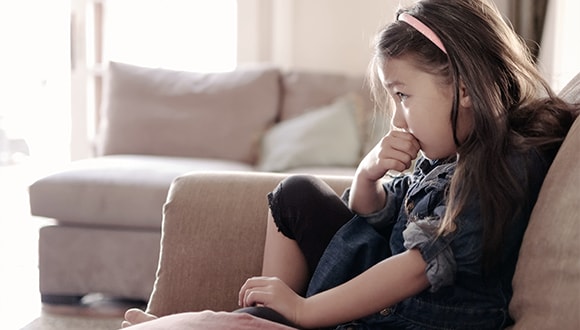Is bad news making our kids anxious?
Kids hear about distressing events through the media and adult conversation around them. Here’s what to do if you think your child is feeling anxious.
Lucy E. Cousins
August 2017
With regular social media, online and television coverage of bad news stories, it can be hard to know if they’re making our children feel anxious or scared.
It can be especially worrying when that news includes children their own age, as it might have recently with the Ariana Grande concert attack or natural disasters such as Cyclone Debbie in Queensland.
“Kids are being bombarded with information through their mobile devices and it can be really difficult to manage their consumption,” says psychologist Dr Travis Kemp. “On top of that, the news is being talked about in the classroom from as early as grades 4 and 5.”
So, how do you spot their early signs of distress, and what’s the best way to deal with it? Dr Kemp recommends these five steps.

1. Give them space
The first step, according to Dr Kemp, is to be aware of how your child is dealing with any bad news, without crowding them and forcing them to talk. Signs of anxiety can include difficulty sleeping, bad dreams, feeling low and avoiding activities they used to enjoy.
“You know your kids better than anyone, so be sensitive to how they’re responding to the news,” says Dr Kemp.
2. Asking them how they feel
Finding the right time to talk is really important. Avoid short car trips, or busy Saturday mornings. Choose a day when there is no pressure to speed up the conversation.
“Just asking them how they feel is a good way to start the conversation,” advises Dr Kemp. “Ask open-ended questions, such as ‘Have you been seeing things on the news lately?’, ‘How do they make you feel?’, ‘Do you talk to your friends about this? What do they say?’”
But make sure you don’t do all the asking, it’s important to let them feel like they can ask questions too – at any time, not just in this conversation.
3. Listen to their concerns
Sometimes asking the questions is the easy part. Listening to the answers might make you feel distressed or you might be trying to work out how you’re going to respond, but the key is to be an active listener, says Dr Kemp.
“Let them fully express how they feel, without interruptions. If they’re scared or worried, give them the opportunity to talk about those feelings. This is a very calming exercise in itself and it creates trust between you.”
4. Manage your own fear
To effectively calm your child and make them feel secure, you first need to manage your own concerns about these subjects. “With the amount of news that we’re exposed to on a daily basis, you can get scared as a parent,” says Dr Kemp. “It’s a bit like whenever there is a new shark attack and people get scared of swimming. The reality is that the risk of a shark attack is very, very low.
“Try to make your child understand this. The way you express that to them is even more important because you’re the one who needs to be calm for them and you’re the one who needs to be supportive and reassuring.”
5. Put it in perspective
Finish up your conversation by putting the situation into perspective. Start by discussing how it seems like there are a lot of distressing events across the world, and closer to home, but prominent media coverage can make them seem more common.
Tailor your conversation based on the child’s age and maturity – younger children (under 11) need the basic facts to help them understand what’s happening, but may find too many details or news coverage disturbing.
Older children and teenagers will have a greater understanding of the situation, but you may want to advise them to avoid overloading themselves with online articles and social media coverage that will only distress them further.
You can also talk about the positives in the situation – the bystanders and emergency services that helped the injured in a car crash or the family who housed people displaced by a severe storm, for example. This can help them gain some perspective, says Dr Kemp.
“Help your children focus on the positives and give them assurance that they can always talk to you about how they feel about these events.”
Related articles
How to care for your teen’s mental health
Recognising emotional issues early is the best way to protect your teenager against depression and anxiety.
10 tips for working parents
It’s a juggling act. Arm yourself with smart strategies to help you balance work and family life.
Raising vegetarian or vegan kids
Saying no to animal products is on the rise, but is a vegetarian or vegan diet suitable for children?
8 ways to keep kids active
Tearing the children away from their screens is easier than you think.